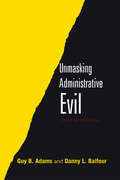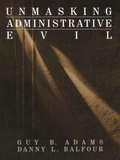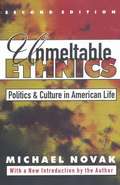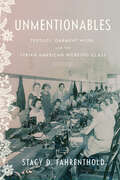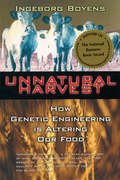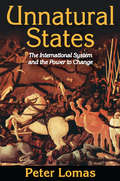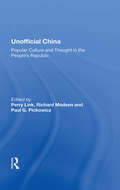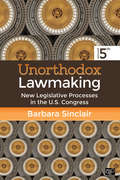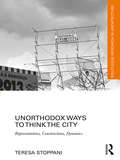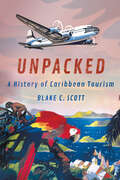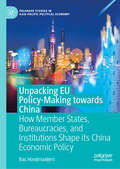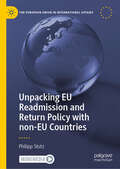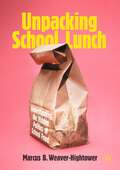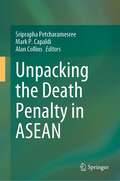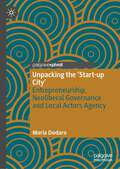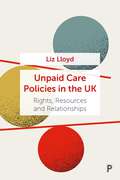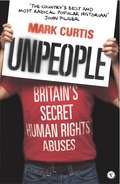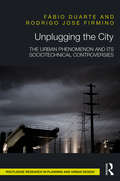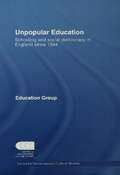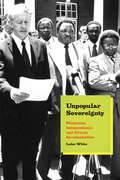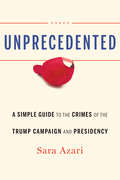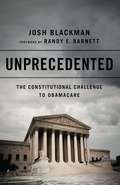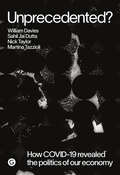- Table View
- List View
Unmasking Administrative Evil
by Guy Adams Danny BalfourThe modern age with its emphasis on technical rationality has enabled a new and dangerous form of evil--administrative evil. Unmasking Administrative Evil discusses the overlooked relationship between evil and public affairs, as well as other fields and professions in public life. The authors argue that the tendency toward administrative evil, as manifested in acts of dehumanization and genocide, is deeply woven into the identity of public affairs. The common characteristic of administrative evil is that ordinary people within their normal professional and administrative roles can engage in acts of evil without being aware that they are doing anything wrong. Under conditions of moral inversion, people may even view their evil activity as good. In the face of what is now a clear and present danger in the United States, this book seeks to lay the groundwork for a more ethical and democratic public life; one that recognizes its potential for evil, and thereby creates greater possibilities for avoiding the hidden pathways that lead to state-sponsored dehumanization and destruction. What's new in the Fourth Edition of Unmasking Administrative Evil: UAE is updated and revised with new scholarship on administrative ethics, evil, and contemporary politics. The authors include new cases on the dangers of market-based governance, contracting out, and deregulation. There is an enhanced focus on the potential for administrative evil in the private sector. The authors have written a new Afterword on administrative approaches to the aftermath of evil, with the potential for expiation, healing, and reparations.
Unmasking Administrative Evil
by Guy B. Adams Danny L. BalfourAlthough social scientists generally do not discuss "evil" in an academic setting, there is no denying that it has existed in public administration throughout human history. Hundreds of millions of human beings have died as a direct or indirect consequence of state-sponsored violence. The authors argue that administrative evil, or destructiveness, is part of the identity of all modern public administration (as it is part of psychoanalytic study at the individual level). It goes beyond a superficial critique of public administration and lays the groundwork for a more effective and humane profession.
Unmeltable Ethnics: Politics And Culture In American Life (Second Edition)
by Michael NovakThis new, enlarged edition of an influential book--originally published in 1972 as The Rise of the Unmeltable Ethnics--extends the author's wise and generous view of ethnicity. Its aim "is to raise consciousness about a crucial part of the American experience: to involve each reader in self-inquiry. Who, after all, are you? What history brought you to where you are? Why are you different from others?" But the point of such inquiry is civility: "The new ethnic consciousness embodied in this book delights in recognition of subtle differences in the movements of the soul. It is not a call to separatism but to self-consciousness. It does not seek division but rather accurate, mutual appreciation."
Unmentionables: Textiles, Garment Work, and the Syrian American Working Class (Worlding the Middle East)
by Stacy FahrentholdAs weavers, garment workers, and peddlers, Syrian immigrants in the Americas fed the early twentieth-century transnational textile trade. These migrants and the commodities they produced—silk, linen, and cotton; lace and embroidery; undergarments and ready-wear clothing—moved along steamship routes from Beirut through Marseille and Madeira to New York City, New England, and Veracruz. As migrants and merchants crisscrossed the Atlantic in pursuit of work, Syrian textile manufacturing expanded across the hemisphere. Unmentionables offers a history of the global textile industry and the Syrians, Lebanese, and Palestinians who worked in it. Stacy Fahrenthold examines how Arab workers navigated processes of racialization, immigration restriction, and labor contestation. She writes women workers—the majority of Syrian garment workers—back into US labor history. She also situates the rise of Syrian American industrial elites, who exerted supply chain power to combat labor uprisings, resist unionization, and stake claim to the global textile industry. Critiquing the hegemony of the Syrian peddler in histories of this diaspora, Unmentionables introduces alternative narrators: union activists who led street demonstrations, women garment workers who shut down kimono factories, child laborers who threw snowballs at police, and the diasporic merchant capitalists who contended with all of them.
Unnatural Harvest: How Genetic Engineering is Altering Our Food
by Ingeborg BoyensAdvertisers may want us to believe that our food is produced on picturesque farms, but the cold reality is that the plants and animals we consume may be the result of genetic engineering in the laboratories of multinational corporations.Biotechnology brings with it implications for human and animal health, the threat of environmental damage, a possible redefining of our global food system and a Pandora's box of ethical questions. But the consuming public remains virtually unaware of the genetic alterations of their food and what that may hold in store.Thoroughly researched and accessibly written, Unnatural Harvest holds nothing back in telling us how the food we now serve ourselves and our children may be altered and why we should be very concerned.
Unnatural States: The International System and the Power to Change
by Peter Ian LomasUnnatural States is a radical critique of international theory, in particular, of the assumption of state agency—that states act in the world in their own right. Peter Lomas argues that since the universal states system is inequitable and rigid, and not all states are democracies anyway, this assumption is unreal, and to adopt it means reinforcing an unjust status quo.Looking at the concepts of state, nation, and agency, Lomas sees populations struggling to find an agreed model of the state, owing to inherited material differences; and unsurprisingly, among theorists of the nation, only controversy and a great confusion of terms. Meanwhile, the functional incarnations of the state agent are caricatures: the mandarin state, the lawyer state, the landlord state, the heir-to-history state, and the patriot state. Yet recent developments in international theory (constructivism, scientific realism, postmodernism) sacrifice state agency only at the price of an unhelpful abstraction.The states system is dysfunctional and obsolete, Lomas contends, and international theory must be recast, with morality as central, to inspire and to guide historic change. He focuses in his conclusion on prescriptions for change, led by four moral concerns: human rights, weapons of mass destruction, relations between rich and poor societies, and the environment."I begin this book," writes Lomas, "with the commonest commonplace of international theory, to expose it as a meaningless cliche. In the masterly hands of Hobbes, it was elaborated into a shock formula for organized society, a reading of history as civilization's failure. Kant sought to rescue morality from Hobbes and create the structures of modernity, but Kant's influence is coming to an end. In the Cold War, politicians disagreeing over another philosopher almost brought the world to an end. Hence the challenges of our time. These are primary and profound. Philosophers have done much to define the modern world. The point of international theory is to change it."
Unofficial China: Popular Culture And Thought In The People's Republic
by Perry LinkThis book presents a view of social life in China and discusses different methods for studying contemporary China as a tool for introducing students to the study of popular culture. Through a diverse set of case studies, it introduces readers to a wide range of issues facing Chinese society.
Unorthodox Lawmaking: New Legislative Processes in the U.S. Congress
by Barbara L. Sinclair"Barbara Sinclair does an excellent job of showing how contemporary lawmaking departs from the traditional legislative process. I can′t imagine teaching a course on Congress without this text—it’s absolutely indispensable." —Philip Klinkner, Hamilton College Most major measures wind their way through the contemporary Congress in what Barbara Sinclair has dubbed "unorthodox lawmaking." In this much-anticipated Fifth Edition of Unorthodox Lawmaking, Sinclair explores the full range of special procedures and processes that make up Congress’s work, as well as the reasons these unconventional routes evolved. The author introduces students to the intricacies of Congress and provides the tools to assess the relative successes and limitations of the legislative process. This dramatically revised Fifth Edition incorporates a wealth of new cases and examples to illustrate the changes occurring in congressional process. Two entirely new case study chapters highlight Sinclair’s fresh analysis and the book is now introduced by a new foreword from noted scholar and teacher, Bruce I. Oppenheimer, reflecting on this book and Barbara Sinclair’s significant mark on the study of Congress.
Unorthodox Lawmaking: New Legislative Processes in the U.S. Congress
by Barbara L. Sinclair"Barbara Sinclair does an excellent job of showing how contemporary lawmaking departs from the traditional legislative process. I can′t imagine teaching a course on Congress without this text—it’s absolutely indispensable." —Philip Klinkner, Hamilton College Most major measures wind their way through the contemporary Congress in what Barbara Sinclair has dubbed "unorthodox lawmaking." In this much-anticipated Fifth Edition of Unorthodox Lawmaking, Sinclair explores the full range of special procedures and processes that make up Congress’s work, as well as the reasons these unconventional routes evolved. The author introduces students to the intricacies of Congress and provides the tools to assess the relative successes and limitations of the legislative process. This dramatically revised Fifth Edition incorporates a wealth of new cases and examples to illustrate the changes occurring in congressional process. Two entirely new case study chapters highlight Sinclair’s fresh analysis and the book is now introduced by a new foreword from noted scholar and teacher, Bruce I. Oppenheimer, reflecting on this book and Barbara Sinclair’s significant mark on the study of Congress.
Unorthodox Lawmaking: New Legislative Processes in the U.S. Congress
by Ms Barbara SinclairDespite what your students may have learned in Schoolhouse Rock, the textbook "how-a-bill-becomes-a-law" scenario is a rarity. As evidenced with health care reform legislation, most major measures wind their way through the contemporary Congress in what Barbara Sinclair has dubbed "unorthodox lawmaking."Whatever path a bill takes--whether considered by multiple committees or subjected to a filibuster in the Senate--Sinclair explores the full range of special procedures and processes that make up the legislative process, as well as the reasons these unconventional routes evolved. This much-anticipated fourth edition updates the book through the end of the 111th Congress. Sinclair incorporates new examples and new case studies throughout, including the economic stimulus bill of 2008, the American Recovery and Reinvestment Act of 2009, and, of course, the health care reform legislation of 2009-2010. New coverage also includes recent developments in the Senate (for example, filling the amendment tree); major changes in how the House and Senate resolve their differences (fewer conferences and more informal bargaining and amendments); and earmarks and changes in the appropriations process. With Sinclair's unique perspective, Unorthodox Lawmaking introduces students to the intricacies of Congress while also providing the tools to assess the relative successes and limitations of the legislative process.
Unorthodox Ways to Think the City: Representations, Constructions, Dynamics (Routledge Research in Architecture)
by Teresa StoppaniThis book argues that architecture and the city and their processes can be better understood by drawing categories from disciplines that exceed the architectural and urban cultural context. It performs an open intellectual reading that traverses architecture and architectural theory, but also art theory and history, cartography, philosophy, literature and cultural studies, to unfold a series of ‘figures’ that are ambiguously placed between the representation and the construction of space in architecture and the city. The paradigm and philosophy, the island and the city, the map and representation, the model and making and the questioning of form performed by dust, are explored beyond their definition, as processes that differently make space between architecture and the city and are proposed as unorthodox analytic techniques to decipher contemporary spatial complexity. The book analyses how these ‘figures’ have been employed at different times and in different creative disciplines, beyond architecture and in relation to changing notions of space, and traces the role that they have played in the shift towards the dynamic that has taken place in contemporary theory and design research. What emerges is the idea of an ‘architecture of the city’ that is not only physical but is largely defined by the way in which its physical spaces are regulated, lived and perceived, but also imagined and projected.
Unpacked: A History of Caribbean Tourism (Histories and Cultures of Tourism)
by Blake C. ScottUnpacked offers a critical, novel perspective on the Caribbean's now taken-for-granted desirability as a tourist's paradise. Dreams of a tropical vacation have become a quintessential aspect of the modern Caribbean, as millions of tourists travel to the region and spend extravagantly to pursue vacation fantasies. At the beginning of the twentieth century, however, travelers from North America and Europe thought of the Caribbean as diseased, dangerous, and, according to many observers, "the white man's graveyard." How then did a trip to the Caribbean become a supposedly fun and safe experience?Unpacked examines the historical roots of the region's tourism industry by following a well-traveled sea route linking the US East Coast with the island of Cuba and the Isthmus of Panama. Blake C. Scott describes how the cultural and material history of US imperialism became the heart of modern Caribbean tourism. In addition, he explores how advances in tropical medicine, perceptions of the tropical environment, and development of infrastructure and transportation networks opened a new playground for visitors.
Unpacking EU Policy-Making towards China: How Member States, Bureaucracies, and Institutions Shape its China Economic Policy (Palgrave Studies in Asia-Pacific Political Economy)
by Bas HooijmaaijersThis book examines different intellectual frameworks for international relations, including the bureaucratic politics model, neorealism, and institutionalism as tools for understanding the European Union’s (EU) China policy. Based on a study of three political economy-related cases, it demonstrates what approaches not just apply, but apply best in various stages of the policy cycle, why some models apply to several policy stages, and why some seem to work better than others in certain policy stages. The three cases include the EU-China solar panel dispute (2012–2018), the EU investigation into Chinese mobile telecommunications networks (2012–2014), and the EU’s response to China’s rise in Africa via the European Commission initiated EU-China-Africa trilateral cooperation initiative in 2008. Those interested in EU-China affairs can apply this innovative analytical framework to these three cases and a wide range of other issues; scholars, journalists, diplomats, and businesspeople will find this book of value.
Unpacking EU Readmission and Return Policy with non-EU Countries (The European Union in International Affairs)
by Philipp StutzThis book offers an in-depth exploration of the European Union's cooperation with non-EU countries on readmission and return, as central components of EU migration policy. It delves into the differences between formal and informal agreements and the factors influencing return rates, critically assessing the ‘effectiveness’ of cooperation in this contentious policy field. Through a comparative analysis of 57 non-EU countries, the book enhances our understanding of why certain countries cooperate on readmission and/or return. Countries geographically closer to the EU are more dependent and, thus, conclude readmission agreements more often. For countries in Africa and Asia, EU incentives and pressure play a bigger role and influence the cooperation together with domestic administrative capacities and bilateral readmission agreements and closer existing relations. Formal or informal readmission cooperation has a limited impact on return rates with non-EU countries beyond the Eastern neighbourhood. This comprehensive work is an essential reading for academics, policymakers, and policy advocates interested in EU external migration cooperation and the broader dynamics of international migration policy.
Unpacking School Lunch: Understanding the Hidden Politics of School Food
by Marcus B. Weaver-HightowerThis book delves into the heated political battles over what kids eat at school, shedding light onto how policymakers craft food policy for schools. The book takes readers inside schools, through the history of school food programs in the United States and England, and into the policy terrain that makes school lunch difficult to change. Through diverse case studies—hungry linebackers, pink slime, English reality television and policy making, pizza as a vegetable, lunch shaming, and more—chapters provide detailed analysis of rhetorical tactics, arguments over, and policy for school feeding. The book concludes with a progressive vision of school food that is healthy, pleasurable, educative, shame-free, and, most importantly, free for all students, just like the rest of school.
Unpacking the Death Penalty in ASEAN
by Alan Collins Sriprapha Petcharamesree Mark P. CapaldiThis book contributes conceptually, theoretically and morally to a deeper understanding of the distinctive Asian perceptions of punishment, justice and human rights. Researched and prepared by scholars who have not only been conducting studies on the death penalty in the region but have also been advocating for legal reforms, this edited book touches upon the different justifications for the use of capital punishment in the ASEAN region, exposing the secrecy, sensitivities and dilemmas that mask violations of international human rights laws. The chapters bring in numerous new perspectives which have been overlooked in the traditional discourse surrounding the use of the death penalty, such as that around crimes that do not meet the threshold of “most serious”; the dignity of death row inmates and their families; contradictions within religion and capital punishment; and the way in which growing authoritarianism and the media are adversely influencing the public’s perception and support for capital punishment in the region. In examining how public opinion shapes state policies towards the death penalty and how it varies according to different offences and different states, the authors critically analyse how the international human rights mechanisms have specifically called for ASEAN member states to refrain from extending the application of the death penalty and to limit it to the “most serious crimes.” Relevant to socio-legal scholars focused on crime and punishment in Southeast Asia, and in the Global South more broadly, this is a landmark collection in criminology and human rights scholarship. Chapter "ASEAN and the Death Penalty: Theoretical and Legal Views and a Pathway to Abolition" is available open access under a Creative Commons Attribution 4.0 International License via link.springer.com.
Unpacking the ‘Start-up City’: Entrepreneurship, Neoliberal Governance and Local Actors Agency
by Maria DodaroThis book provides an invaluable overview of neoliberalising trends in urban policies and governance by presenting novel perspectives on municipal entrepreneurship support policies. It seeks to address a current lack of in-depth empirical knowledge of this topic and the reference literature’s silence on local actors agency. The book ’s scholarly debate around the impact of neoliberal capitalism on cities interweaves with empirical observations in the European cities of Barcelona and Milan with a view to examining what lies behind the “start-up city” label, and the way local actors reproduce, contest and re-signify entrepreneurship policies and practices in a highly individualised context. Based on more than sixty interviews with key policy actors, including young beneficiaries, it sheds light on their representations, motivations, intentions and room for manoeuvre in a way that encompasses local specificities in which multi-scalar economic, social, institutional and cultural processes interact. Finally, this book offers new insights into critical entrepreneurship studies and current debates about convergence and divergence trends in urban policies and governance.
Unpaid Care Policies in the UK: Rights, Resources and Relationships
by Liz LloydThis book examines policies on unpaid care throughout the UK since the 1990 NHS and Community Care Act. It questions why, after decades of policies and strategies, unpaid care remains in a marginal position in the social care system and in society more broadly, as demonstrated during the COVID-19 pandemic. It provides critical analysis of key policies and professional practice over three decades and highlights the continuing challenges faced by people in caring relationships, as well as reflecting on developments in the position of unpaid carers in the system of social care. By questioning why this crucially important sphere of human life remains under-resourced, it sheds light on the ways in which care is understood and how policy makers and service providers perceive the need for support.
Unpeople: Britain's Secret Human Rights Abuses
by Mark CurtisBritain is complicit in the deaths of ten million people. These are Unpeople - those whose lives are seen as expendable in the pursuit of Britain's economic and political goals.In Unpeople, Mark Curtis shows that the Blair government is deepening its support for many states promoting terrorism and, using evidence unearthed from formerly secret documents, reveals for the first time the hidden history of unethical British policies, including: support for the massacres in Iraq in 1963; the extraordinary private backing of the US in its aggression against Vietnam; support for the rise of Ugandan dictator Idi Amin; the running of a covert 'dirty war' in Yemen in the 1960s; secret campaigns with the US to overthrow the governments of Indonesia and British Guiana; the welcoming of General Pinochet's brutal coup in Chile in 1973; and much more. This explosive new book, from the author of Web of Deceit, exposes the reality of the Blair government's foreign policies since the invasion of Iraq. It discloses government documents showing that Britain's military is poised for a new phase of global intervention with the US, and reveals the extraordinary propaganda campaigns being mounted to obscure the reality of policies from the public.
Unplugging the City: The Urban Phenomenon and its Sociotechnical Controversies
by Fábio Duarte Rodrigo Jose FirminoModernity has entrusted technology with such power that it is treated as an autonomous entity, with its own manners and morals. Technological disruptions are also socially disruptive: technological failures reveal both the constituents of the technology itself and the social fabric woven by this technology. Cities are the quintessential technological arrangement, not only materially but also as a conceptual framework: the ubiquity of technology makes us think and plan cities mostly in terms of technological arrangements. Unplugging the City: The Urban Phenomenon and its Sociotechnical Controversies proposes a conceptual and methodological framework for analyzing certain urban phenomena as a technological assemblage. It demonstrates, through multiple case studies, the sociotechnical complexities involved in the stabilization and disruption of urban technological arrangements. Examples range from the urban phantasmagorias portrayed in science-fiction movies to the urban proposals of Brasilia and Masdar, from the book of bike-sharing systems to pervasive global surveillance systems. Written by Fábio Duarte and Rodrigo Firmino, based on their original research and publications, this is an essential resource for those interested in the theory and study of technology and its inextricable influence on the city.
Unpopular Education: Schooling and Social Democracy in England since 1944
by CccsPublished in the year 2006, Unpopular Education is a valuable contribution to the field of Media and Cultural Studies.
Unpopular Sovereignty: Rhodesian Independence and African Decolonization
by Luise WhiteIn 1965 the white minority government of Rhodesia (after 1980 Zimbabwe) issued a unilateral declaration of independence from Britain, rather than negotiate a transition to majority rule. In doing so, Rhodesia became the exception, if not anathema, to the policies and practices of the end of empire. In Unpopular Sovereignty, Luise White shows that the exception that was Rhodesian independence did not, in fact, make the state that different from new nations elsewhere in Africa: indeed, this history of Rhodesian political practices reveals some of the commonalities of mid-twentieth-century thinking about place and race and how much government should link the two. White locates Rhodesia’s independence in the era of decolonization in Africa, a time of great intellectual ferment in ideas about race, citizenship, and freedom. She shows that racists and reactionaries were just as concerned with questions of sovereignty and legitimacy as African nationalists were and took special care to design voter qualifications that could preserve their version of legal statecraft. Examining how the Rhodesian state managed its own governance and electoral politics, she casts an oblique and revealing light by which to rethink the narratives of decolonization.
Unprecedented: A Simple Guide to the Crimes of the Trump Campaign and Presidency
by Sara AzariThe Trump administration&’s attempted and actual violations of the Constitution and the law have surpassed our worst expectations again and again. Add to that the legal morass surrounding members of the Trump campaign staff, and the United States finds itself led by the most corrupt administration in modern American history. The investigation by Special Counsel Robert Mueller on 2016 election interference and obstruction of justice led to multiple indictments that boggle even the brightest legal minds. So how can the rest of us make sense of it all? Sara Azari breaks down the investigations, evidence, criminal charges, and defenses involving an ever-expanding rogues&’ gallery of Trump associates and campaign members, as well as the president&’s own criminal conduct. Her docket also includes a comprehensive summary and expert analysis of the Mueller Report. Azari addresses the consequences of President Trump&’s conduct and considers whether the president of the United States is ever above the law. An essential nonpartisan guide, Unprecedented gives readers the tools they need to understand the legal issues engulfing Trump&’s campaign and presidency.
Unprecedented: The Constitutional Challenge to Obamacare
by Randy E. Barnett Josh BlackmanIn 2012, the United States Supreme Court became the center of the political world. In a dramatic and unexpected 5-4 decision, Chief Justice John Roberts voted on narrow grounds to save the Affordable Care Act, commonly known as Obamacare. Unprecedented tells the inside story of how the challenge to Obamacare raced across all three branches of government, and narrowly avoided a constitutional collision between the Supreme Court and President Obama. <p><p> On November 13, 2009, a group of Federalist Society lawyers met in the Mayflower Hotel in Washington, D.C., to devise a legal challenge to the constitutionality of President Obama's "legacy" — his healthcare reform. It seemed a very long shot, and was dismissed peremptorily by the White House, much of Congress, most legal scholars, and all of the media. Two years later the fight to overturn the Affordable Care Act became a political and legal firestorm. When, finally, the Supreme Court announced its ruling, the judgment was so surprising that two cable news channels misreported it and announced that the Act had been declared unconstitutional. <p> Unprecedented offers unrivaled inside access to how key decisions were made in Washington, based on interviews with over one hundred of the people who lived this journey — including the academics who began the challenge, the attorneys who litigated the case at all levels, and Obama administration attorneys who successfully defended the law. It reads like a political thriller, provides the definitive account of how the Supreme Court almost struck down President Obama's "unprecedented" law, and explains what this decision means for the future of the Constitution, the limits on federal power, and the Supreme Court.
Unprecedented?: How COVID-19 Revealed the Politics of Our Economy (Goldsmiths Press / PERC Papers)
by Nick Taylor William Davies Martina Tazzioli Sahil Jai DuttaA critical and evidence-based account of the COVID-19 pandemic as a political–economic rupture, exposing underlying power struggles and social injustices.The dawn of the COVID-19 pandemic represented an exceptional interruption in the routines of work, financial markets, movement across borders and education. The policies introduced in response were said to be unprecedented—but the distribution of risks and rewards was anything but. While asset-owners, outsourcers, platforms and those in spacious homes prospered, others faced new hardships and dangers. Unprecedented? explores the events of 2020-21, as they afflicted the UK economy, as a means to grasp the underlying dynamics of contemporary capitalism, which are too often obscured from view. It traces the political and cultural contours of a "rentier nationalism," that was lurking prior to the pandemic, but was accelerated and illuminated by COVID-19. But it also pinpoints the contradictions and weaknesses of this capitalist model, and the new sources of opposition that it meets. An empirical, accessible and critical analysis of the COVID economy, Unprecedented? is essential reading for anyone seeking to understand the political and economic turbulence of the pandemic&’s first eighteen months.
